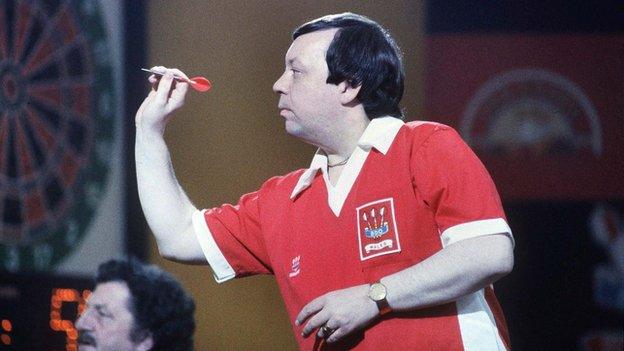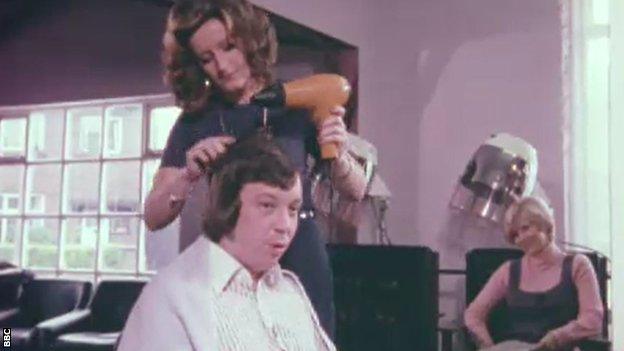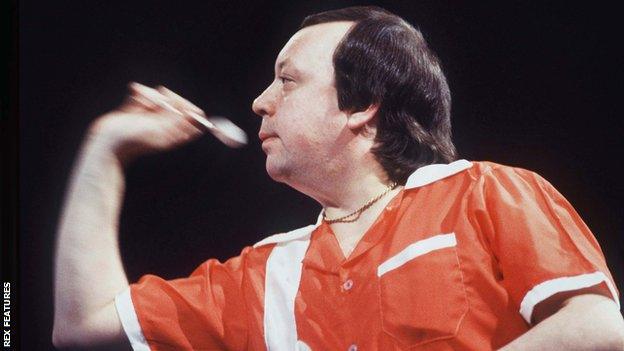Alan Evans: The life and career of the godfather of darts
- Published

Alan Evans became a millionaire during his career
Wales are firmly at the top of the darting world once again.
World Champion in 2021, and the current world number one, Gerwyn Price is from Markham and Pontyberem's Jonny Clayton won four major television titles last year including the Premier League on his debut.
But it was players like Alan 'The Arrow' Evans, one of the first superstars and trailblazers of the sport, who originally put Wales on the darting map and paved the way for a new generation of professional players.
"The modern dart player wouldn't say what I'm going to say," said Bobby George, who won the News of the World Darts Championship twice and was a good friend of Evans.
"But what Alan did, he set it up and all the darts players if they can do it for a living and be a professional, you've got to do it like Alan did it."
'Rhondda Fats'
Born in Ferndale in the Rhondda Valley, Evans was brought up at the Ferndale Hotel, run by his parents, and where he first picked up his love of darts.
Darts however was not the only sport Evans played, he also enjoyed boxing and table tennis.
However football was his main sport, but his dreams of playing for Cardiff City were dashed when he was hampered by rheumatic fever in his left knee during trials for the club.
The tungsten arrows soon replaced football as his main passion and he started to earn a very good living from his talents on the oche.
He became one of the first players to appear on television when he reached the final of the 1972 News of the World Championships.
There were 12,000 fans in the audience at London's Alexandra Palace with another seven million watching on television.
Unfortunately Evans was beaten 2-0 by England's Brian Netherton but the exposure led Evans to becoming widely recognised.
In 1973, The Indoor League series burst onto television, created and produced by the legendary darts commentator Sid Waddell, showcasing the best players from pubs and clubs across Britain.
Evans was one of the first to appear in the series and in his semi-final match against fellow Welshman Tony Ridler, he became the first ever male player to score a 180 on television.
Despite never winning an Indoor League title, his popularity grew thanks to his effortless throw and natural showmanship.
The professional
After winning the inaugural British Open and World Masters in 1975, the lure of big-time darts saw Evans hit the road and leave south Wales for Stockport - the centre of a huge darts scene.
Basing himself at the Midland Hotel, where Daimler Sovereign would drop him off for match practise, Evans would travel around the area, playing exhibition matches in front of packed houses for large sums of money.
His wife Jean would even take part in exhibitions as a female player.
Before the advent of the PDC Premier League, where fans can see the world's top players compete weekly throughout the country in arenas, exhibitions at working men's clubs and pubs were the way forward.
George said: "Evans realised that it was not worth paying out of your pocket to win a trophy, to get world ranking points or to say, 'I won the Swedish open,' and they'd give you a bunch of flowers."
Top prizes back then could be £1,000 but Evans could make more money through exhibition matches than competing on the tour.
Adding a sense of professionalism and glamour, he would turn up at the matches with a full roadshow, including an electric scoreboard, his own referee and announcer.

Alan Evans was inspired by fashionable Americans he met when he travelled across the Atlantic for tours
Evans took pride in his appearance and brought showbiz into the world of darts.
He would visit the local hairdressers to get his hair styled and blow dried before he went to every exhibition.
He would walk onto the oche in grey or cream trousers, with his lucky red shirt, sometimes wearing a badge which read 'Proud to be Welsh' and with a leek in his hand.
This showbiz personality and flamboyant style helped propel him towards superstardom and rubbing shoulders with George Best, Tom Jones and Muhammad Ali.
Evans even played a match against Ali in 1977 in South Shields, and although playing with a huge handicap which meant he could only hit trebles, he was beaten by the boxer who hit a bullseye to win the match and declared himself 'The Darts Champion of the World'.
The old enemy
Evans could be temperamental on the oche and had a famous rivalry with Eric Bristow, both players reportedly hated each other.
It came to a head in the 1979 BDO World Darts Championship in Stoke-on-Trent, when Evans beat Bristow 3-1 in the quarter-finals.
Evans felt the young Englishman was blowing the smoke from his cigarette deliberately in his way to put him off his game and Evans, who disliked smoking, got wound up and ended up allegedly headbutting Bristow.
Evans was handed a ban afterwards with Bristow receiving a slap on the wrists.
Dragon darts
Evans wasn't the only Welshman at the top of the game, Leighton 'Marathon Man' Rees from Ynysybwl - only 10 miles over the mountain from Evans - was a good friend.
They would go everywhere together and even sometimes share their winnings.
Rees went on to become the first BDO World Champion in 1978, and twice defeated Evans at the semi-final stage of the World Championships.
Both players had contrasting styles, Rees throwing with a more measured and slow pace whereas Evans threw his darts smoothly, quickly, almost effortlessly.
Proud Welshman Evans captained Wales and was the first player to reach 50 caps for his country.
In 2020 two current stars of the sport, Gerwyn Price and Jonny Clayton, helped Wales to win the PDC World Cup of Darts for the first time.
However Evans was part of the Wales team who won the first ever darts World Cup, held by the World Darts Federation back in 1977, alongside his good pal Rees.

Alan Evans appeared on 'Bullseye' in 1985 and got the highest score ever recorded with nine-darts on the programme, 401.
After moving back to Barry in south Wales to reconnect with his roots, ill-health affected Evans and he withdrew from playing on the circuit with kidney problems in 1988.
He made a return to the stage in 1997, competing in the 'Battle of Champions' against his old rival Bristow in what would be Evans' final television appearance.
He eventually lost 3-0, saying afterwards that nerves got to him as it had been nine years since he was on television competing.
Sadly, his health took a turn for the worse and Evans watched his beloved Wales beat England 32-31 in that iconic match in Wembley in 1999 from his hospital bed, passing away peacefully the following morning, at the age of only 49.
His legacy lives on in the sport and for the players who grace the oche today.
"He was the first one," said George.
"Taking darts out of a pub and showing what you can do with it, the entertainment he gives."
World Championship finalist on six occasions, Tony O'Shea, worked for Evans as chalker and roadie on his exhibitions.
Of his good friend Evans, O'Shea said: "I always put him down as my favourite player.
"He had the most beautiful action, so smooth, it looked perfect his throw and I loved watching him play."
'Legends of Welsh Sport: Alan Evans' airs on BBC One Wales on Wednesday, 23 February at 21:30 GMT.